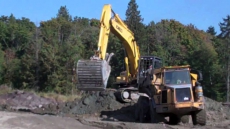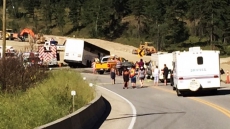NEW WESTMINSTER, B.C. — A judge may not be able to solve homelessness, but he could use his powers to bar officials in Abbotsford, B.C., from prohibiting camps that provide the necessities of life, a lawyer has argued.
B.C. Supreme Court heard Friday that there's ample evidence that dozens of people living in makeshift tent communities have been subjected to "systemic forced evictions" in the Fraser Valley city.
City officials have dumped chicken manure on campsites, said David Wotherspoon, a lawyer with Pivot Legal Society.
Police have pepper sprayed people's belongings, cut up tents and laid down tree trunks in a series of "displacement tactics," he added.
"We're not asking court to order that housing be provided," Wotherspoon told the judge.
"But what the court can do is tell the City of Abbotsford that if those necessities are not being provided in some other way, they cannot interfere with an individual's efforts to obtain them themselves."
Wotherspoon's assertion comes at the culmination of a five-week trial launched by the Drug War Survivors, who are challenging city bylaws that make it illegal to set up shelters in public spaces.
The group representing the area's homeless contends the city has been consistently violating their charter rights.
A favourable decision would establish a right to public space for homeless people and be a crucial step toward recognizing a right to housing in Canada, according to Pivot, the legal advocacy organization helping the homeless group.
Court heard there were at least 151 homeless in Abbotsford in 2014, people who have been consistently chased from site to site rather than be offered genuine living assistance.
They have been criminalized to the point where there's no place where they won't be breaching the law, Wotherspoon said in his closing arguments.
The city's lawyers have stated multiple facilities are available, but Wotherspoon called the claim a "red herring." Only 25 true beds can be counted, he said.
Some of the city's so-called shelters are actually treatment centres that have a high threshold for admittance, he countered.
"What Abbotsford's goal has really been is to move people out of Abbotsford," he said.
Chief Justice Christopher Hinkson told the lawyer there are legal restrictions and other considerations confronting him in the case.
"I have some very serious concerns about perpetuating a situation where there are hundreds of hypodermic needles, human feces, rotting garbage. It's an unhealthy environment," he added from the bench.
"If your clients … aren't able to avoid those kind of problems, giving them carte blanch to stay as long as they like in a location doesn't seem to be an effective answer."
Outside court, a former homeless man of 15 years described his struggles on the street and said he hopes the judge allocates land for people to inhabit.
"I've lived out there. I've been freezing cold where my hands were so numb I had to warm my hands over a candle," said Harvey Clause, 54, who testified at the trial.
"I think we have a chance to do something for people. We do, if the judge is willing to give us a chance."
The trial is scheduled to conclude next week.






